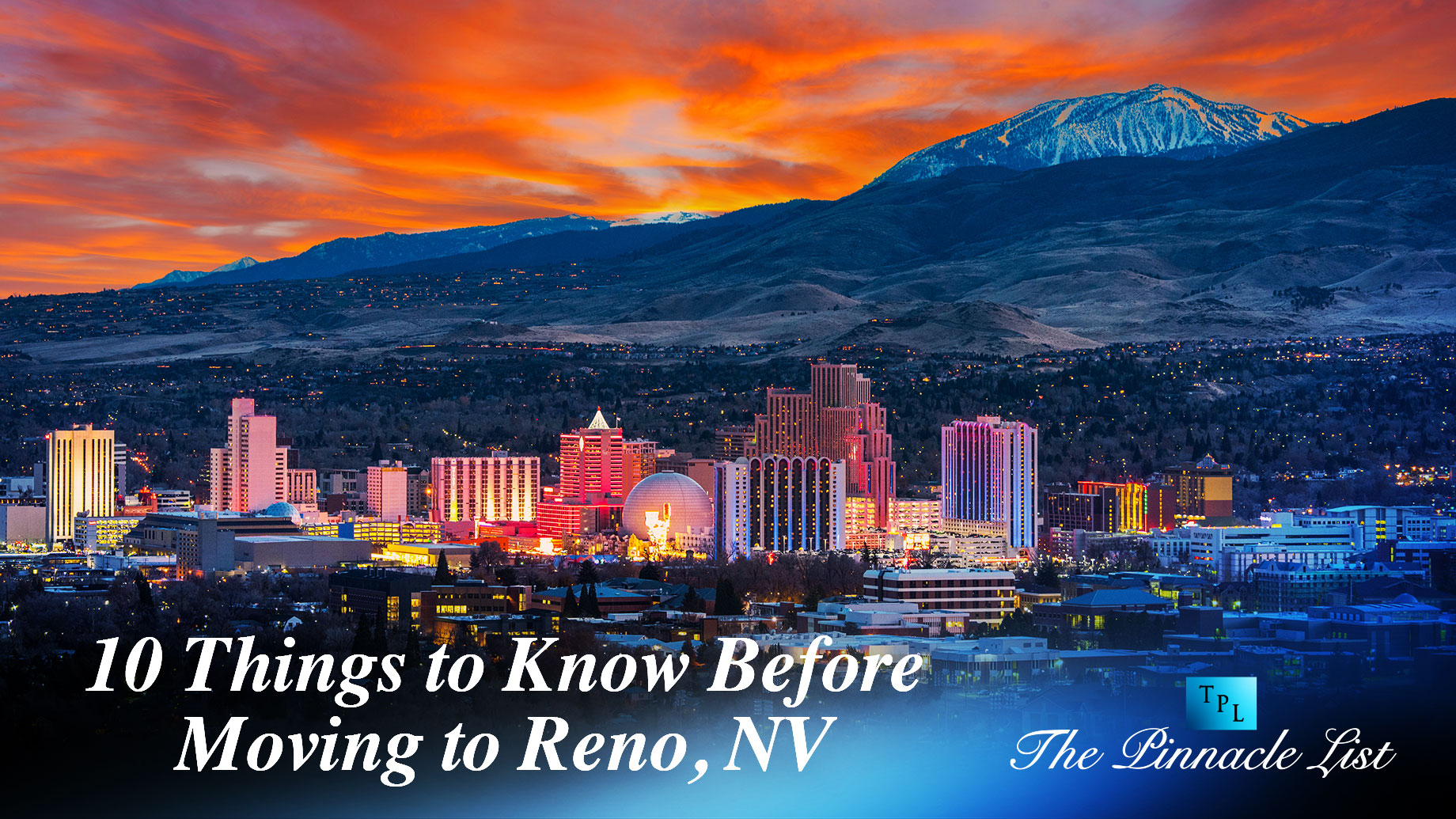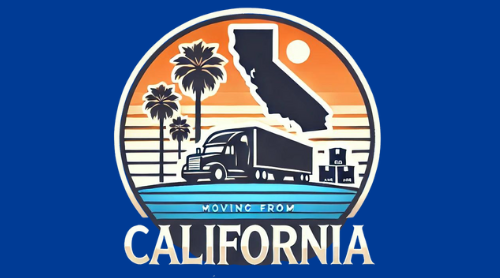Moving From San Francisco To Reno
San Francisco, the City by the Bay, is renowned for its iconic landmarks, vibrant cultural scene, and unparalleled opportunities. However, the high cost of living, congested streets, and stiff competition can make it challenging for individuals and families to maintain a comfortable lifestyle. For those seeking a more relaxed pace, affordable living, and easy access to outdoor recreation, Reno, Nevada, is emerging as an attractive alternative. Located just a few hours east of San Francisco, Reno offers a unique blend of small-town charm and big-city amenities, making it an ideal destination for those looking to escape the Bay Area's chaos.

Things to Consider When Moving From San Francisco to Reno
When considering a move from San Francisco to Reno, there are several factors to take into account. From cost of living to job opportunities, here are some key things to consider:
Cost of Living
One of the primary reasons people move from San Francisco to Reno is the significant difference in cost of living. Reno has a much lower cost of living compared to San Francisco, with lower housing costs, lower taxes, and lower prices for food, transportation, and other necessities. According to Zillow, the median home value in Reno is around $370,000, compared to over $1 million in San Francisco. Additionally, Reno has no state income tax, whereas California has a top marginal rate of 13.3%.
| City | Median Home Value | State Income Tax Rate |
|---|---|---|
| Reno | $370,000 | 0% |
| San Francisco | $1,000,000+ | 13.3% |
Job Opportunities
While San Francisco is known for its thriving tech industry, Reno is also becoming a hub for tech companies, with companies like Tesla, Google, and Amazon establishing a presence in the area. Additionally, Reno has a strong healthcare industry, with several major hospitals and medical research centers. However, the job market in Reno is smaller than in San Francisco, and salaries may be lower.
Housing
Reno has a wide range of housing options, from apartments to single-family homes, and everything in between. The city has seen a surge in new housing developments in recent years, with many new communities and neighborhoods springing up. However, the housing market in Reno is still relatively tight, and prices are rising.
Transportation
Reno has a relatively small airport, with fewer flights and destinations compared to San Francisco International Airport. However, the city is within driving distance of several major cities, including Sacramento, Lake Tahoe, and San Francisco. Additionally, Reno has a public transportation system, including buses and a downtown trolley.
Lifestyle
Reno has a more laid-back, outdoor-focused lifestyle compared to San Francisco. The city has numerous parks, trails, and outdoor recreation areas, and is close to Lake Tahoe and the Sierra Nevada mountains. Additionally, Reno has a growing arts and cultural scene, with several museums, galleries, and performance venues. However, the city may lack some of the amenities and cultural attractions of San Francisco.
Is it worth moving to Reno, Nevada?

Pros of Moving to Reno, Nevada
Reno, Nevada, is a city that offers a unique blend of outdoor recreation, cultural attractions, and economic opportunities. Here are some pros of moving to Reno:
When considering moving to Reno, you'll want to think about the quality of life. Reno offers a more relaxed pace of life compared to bigger cities like San Francisco or Los Angeles. The city also boasts a strong sense of community, with many outdoor festivals and events throughout the year. Additionally, Reno has a relatively low cost of living, making it an attractive option for those looking to escape the high costs of living in California.
Some benefits of moving to Reno include:
- Easy access to outdoor recreation, such as skiing, hiking, and biking
- A growing tech industry, with companies like Tesla and Google establishing a presence in the area
- A thriving cultural scene, with numerous art galleries, museums, and performance venues
Cons of Moving to Reno, Nevada
While Reno has many advantages, it's not without its drawbacks. Here are some cons to consider:
One of the biggest concerns for those moving to Reno is the job market. While the tech industry is growing, the job market is still relatively limited compared to larger cities. Additionally, Reno's economy is heavily reliant on the tourism industry, which can be seasonal and subject to fluctuations. The city is also known for its traffic congestion, which can be frustrating for commuters.
Some downsides of moving to Reno include:
- Limited job opportunities in certain industries
- Traffic congestion and limited public transportation options
- A relatively high crime rate compared to other cities of similar size
Things to Consider Before Moving to Reno, Nevada
Before making the decision to move to Reno, there are several things to consider. Here are a few key factors to think about:
Climate is a major consideration for those moving to Reno. The city experiences a high desert climate, with hot summers and cold winters. Additionally, Reno is located in a seismically active area, which means that earthquakes are a possibility. It's also important to think about education, as Reno's schools are not always highly rated.
Some things to consider before moving to Reno include:
- The city's unique climate and potential for extreme weather events
- The quality of schools and education in the area
- The availability of healthcare services and medical facilities
What are the pros and cons of Reno, Nevada?

Reno, Nevada is a city located in the northwestern part of the state, known for its natural beauty, outdoor recreational opportunities, and a growing tech industry. However, like any other city, it has its pros and cons.
Pros of Living in Reno, Nevada
Reno offers a wide range of benefits to its residents, including:
- Natural Beauty: Reno is surrounded by the Sierra Nevada mountains, providing easy access to outdoor activities such as hiking, skiing, and fishing.
- Outdoor Recreation: The city has numerous parks, trails, and lakes, making it an ideal location for people who love the outdoors.
- Tax-Friendly: Nevada has no state income tax, which can be a significant advantage for individuals and businesses.
- Growing Tech Industry: Reno has become a hub for tech companies, with many major corporations such as Tesla, Google, and Microsoft having a presence in the city.
- Affordable Cost of Living: Compared to other Western states, Reno has a relatively low cost of living, making it an attractive option for people looking to relocate.
Cons of Living in Reno, Nevada
While Reno has many advantages, it also has some drawbacks, including:
- Traffic Congestion: Reno's rapid growth has led to increased traffic congestion, making commuting times longer.
- Weather Extremes: Reno experiences cold winters and hot summers, which can be challenging for some people.
- Limited Cultural Diversity: Compared to larger cities, Reno has limited cultural diversity, which may not appeal to everyone.
- Crime Rate: Reno has a higher crime rate compared to other cities of similar size, with a focus on property crimes.
- Seasonal Economy: Reno's economy is heavily reliant on tourism, which can lead to seasonal fluctuations in employment and economic activity.
Things to Consider Before Moving to Reno, Nevada
Before making the decision to move to Reno, there are several factors to consider, including:
- Job Opportunities: While Reno has a growing tech industry, job opportunities may be limited in other sectors.
- Housing Costs: While the cost of living is relatively low, housing costs are rising rapidly due to the city's growth.
- Education System: Reno's education system has received mixed reviews, with some schools performing better than others.
- Healthcare Options: Reno has limited healthcare options compared to larger cities, which may be a concern for some individuals.
- Community Involvement: Reno has a strong sense of community, with many opportunities to get involved in local events and organizations.
How many Californians moved to Reno?

The number of Californians who moved to Reno, Nevada is a topic of interest in recent years. According to a report by the Nevada Department of Employment, Training and Rehabilitation, from 2018 to 2020, approximately 47,000 people moved from California to the Reno-Sparks area. This influx of Californians has contributed to the region's population growth, economic development, and changes in the local housing market.
Reasons for the Migration
One of the primary reasons Californians are moving to Reno is the affordable cost of living. The cost of living in Reno is significantly lower compared to many parts of California, especially the San Francisco Bay Area and Los Angeles. Here are some key factors:
- The median home price in Reno is around $420,000, compared to over $1 million in the Bay Area.
- Reno has a lower sales tax rate (7.725%) compared to California (7.25% to 10.25%).
- The overall cost of living in Reno is about 44% lower than in San Francisco.
Impact on the Local Economy
The influx of Californians has had a significant impact on the local economy. Many of these new residents are bringing their high-tech skills and entrepreneurial spirit, contributing to the growth of Reno's tech industry. Here are some key effects:
- Reno has seen a surge in startup companies, with many founded by former Californians.
- The city has invested in new infrastructure, including a downtown innovation district and a startup accelerator.
- The region's unemployment rate has decreased, with many new job opportunities in tech, healthcare, and other industries.
Changes in the Housing Market
The influx of Californians has also led to changes in the Reno housing market. Here are some key trends:
- The demand for housing has increased, driving up home prices and rents.
- New housing developments are being built to accommodate the growing population.
- There is a growing trend towards urbanization, with many Californians preferring to live in downtown Reno or nearby neighborhoods.
What is the quality of life in Reno NV?

The quality of life in Reno, NV is a topic of interest for many individuals considering relocating to the area. Reno, also known as the Biggest Little City in the World, offers a unique blend of urban amenities and outdoor recreation opportunities.
Cost of Living
The cost of living in Reno is relatively low compared to other cities in the western United States. The median home price is around $340,000, and the average rent for a one-bedroom apartment is approximately $1,100 per month. Additionally, Reno has a relatively low sales tax rate of 6.85%, which can help stretch a dollar further. Here are some examples of typical costs in Reno:
- Housing: The median home price is $340,000, and the average rent for a one-bedroom apartment is $1,100 per month.
- Food: A meal at a mid-range restaurant costs around $15 per person, and a gallon of milk costs approximately $2.50.
- Transportation: Gasoline is around $2.50 per gallon, and a monthly public transportation pass costs $65.
Outdoor Recreation
Reno is nestled in the heart of the Sierra Nevada mountains, providing endless opportunities for outdoor recreation. The city has over 300 days of sunshine per year, making it an ideal location for individuals who enjoy spending time outdoors. Here are some popular outdoor activities in Reno:
- Hiking and Camping: Reno has numerous hiking and camping spots, including Tahoe Rim Trail and Washoe Lake State Park.
- Skiing and Snowboarding: Reno is close to several world-class ski resorts, including Squaw Valley and Alpine Meadows.
- Fishing and Boating: Reno has several lakes and rivers, including Lake Tahoe and the Truckee River, that offer fishing and boating opportunities.
Cultural and Entertainment Options
Reno has a thriving cultural scene, with a variety of events and attractions that cater to different interests. Here are some popular cultural and entertainment options in Reno:
- Arts and Culture: Reno has a number of art galleries, museums, and performance venues, including the Nevada Museum of Art and the Pioneer Center for the Performing Arts.
- Casinos and Nightlife: Reno is known for its casinos, including the Atlantis Casino Resort and the Grand Sierra Resort, which offer a range of gaming options and entertainment.
- Festivals and Events: Reno hosts several festivals throughout the year, including the Reno River Festival and the Nevada State Fair.
FAQ
What are the cost of living differences between San Francisco and Reno?
When considering a move from San Francisco to Reno, one of the most significant factors to think about is the cost of living. Reno's cost of living is approximately 45% lower than San Francisco's, which can make a substantial difference in your lifestyle. Housing costs, in particular, are much lower in Reno, with the median home price being around $430,000 compared to San Francisco's whopping $1.4 million. Additionally, Reno's lower state income tax rate of 0% compared to California's 9.3% can also lead to significant savings. Overall, the cost of living differences between the two cities can have a substantial impact on your budget and quality of life.
How do the job markets in San Francisco and Reno compare?
Both San Francisco and Reno have thriving job markets, but they cater to different industries. San Francisco is a hub for technological innovation, with many major tech companies like Google, Facebook, and Twitter headquartered there. Reno, on the other hand, is becoming a hotspot for startups and entrepreneurs, with a growing presence of companies like Tesla, Panasonic, and Switch. While San Francisco's job market is more competitive, Reno's is more diverse and emerging. Reno's unemployment rate is slightly higher than San Francisco's, but the city is experiencing rapid growth, and new job opportunities are popping up regularly.
What are the cultural differences between San Francisco and Reno?
San Francisco and Reno have distinct cultural identities shaped by their unique histories and environments. San Francisco is known for its diverse, urban, and liberal atmosphere, with a strong presence of art, music, and LGBTQ+ communities. Reno, on the other hand, has a more small-town, outdoor-oriented vibe, with a rich history in the gaming industry and a growing arts scene. While San Francisco is a bustling metropolis, Reno is a more laid-back city that offers easier access to outdoor activities like skiing, hiking, and kayaking. Reno's proximity to Lake Tahoe also makes it an attractive option for nature lovers.
How do the transportation options in San Francisco and Reno compare?
When it comes to transportation, San Francisco and Reno have different strengths and weaknesses. San Francisco has a comprehensive public transportation system, including buses, trains, and iconic cable cars, making it easy to get around without a car. Reno, on the other hand, is more car-dependent, with limited public transportation options. However, Reno's compact size and relatively low traffic make it easy to navigate, and the city is investing in improving its public transportation infrastructure. Additionally, Reno's close proximity to the Sierra Nevada mountains and Lake Tahoe makes it an ideal location for outdoor enthusiasts who enjoy exploring the region by car.
